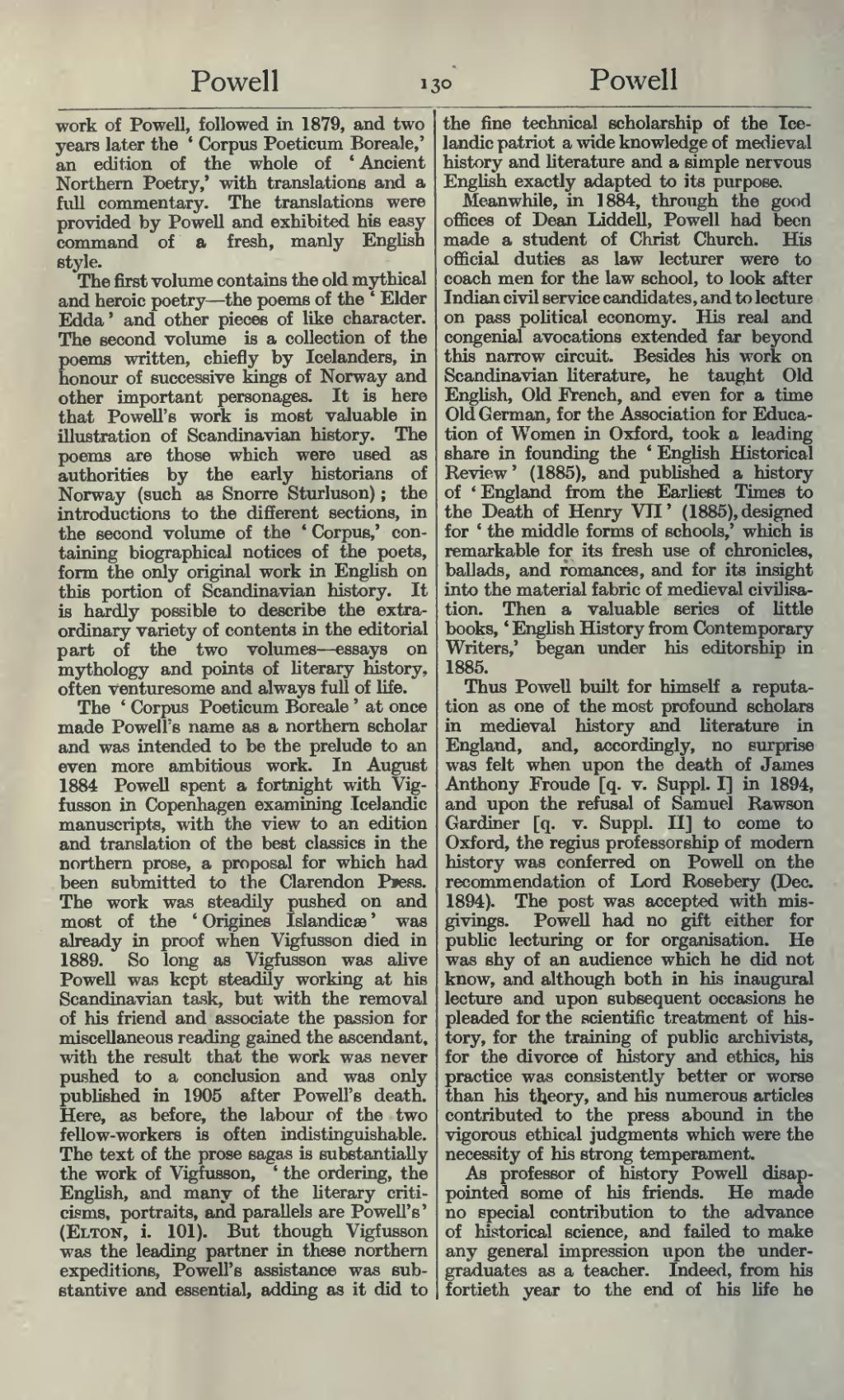work of Powell, followed in 1879, and two years later the 'Corpus Poeticum Boreale,' an edition of the whole of 'Ancient Northern Poetry,' with translations and a full commentary. The translations were
provided by Powell and exhibited his easy command of a fresh, manly English style.
The first volume contains the old mythical and heroic poetry — the poems of the 'Elder Edda' and other pieces of like character. The second volume is a collection of the poems written, chiefly by Icelanders, in honour of successive kings of Norway and other important personages. It is here that Powell's work is most valuable in illustration of Scandinavian history. The poems are those which were used as authorities by the early historians of Norway (such as Snorre Sturluson) ; the introductions to the diflferent sections, in the second volume of the 'Corpus,' containing biographical notices of the poets, form the only original work in English on this portion of Scandinavian history. It is hardly possible to describe the extraordinary variety of contents in the editorial part of the two volumes — essays on mythology and points of literary history, often venturesome and always full of life. The 'Corpus Poeticum Boreale' at once made Powell's name as a northern scholar and was intended to be the prelude to an even more ambitious work. In August 1884 Powell spent a fortnight with Vigfusson in Copenhagen examining Icelandic manuscripts, with the view to an edition and translation of the best classics in the northern prose, a proposal for which had been submitted to the Clarendon Press. The work was steadily pushed on and most of the 'Origines Islandicse' was already in proof when Vigfusson died in 1889. So long as Vigfusson was alive Powell was kept steadily working at his Scandinavian task, but with the removal of his friend and associate the passion for miscellaneous reading gained the ascendant, with the result that the work was never pushed to a conclusion and was only published in 1905 after Powell's death. Here, as before, the labour of the two fellow-workers is often indistinguishable. The text of the prose sagas is substantially the work of Vigfusson, 'the ordering, the English, and many of the literary criticisms, portraits, and parallels are Powell's' (Elton, i. 101). But though Vigfusson was the leading partner in these northern expeditions, Powell's assistance was substantive and essential, adding as it did to the fine technical scholarship of the Icelandic patriot a wide knowledge of medieval history and literature and a simple nervous English exactly adapted to its purpose.
Meanwhile, in 1884, through the good offices of Dean Liddell, Powell had been made a student of Christ Church. His official duties as law lecturer were to coach men for the law school, to look after Indian civil service candidates, and to lecture on pass political economy. His real and congenial avocations extended far beyond this narrow circuit. Besides his work on Scandinavian literature, he taught Old English, Old French, and even for a time Old German, for the Association for Education of Women in Oxford, took a leading share in founding the 'English Historical Review' (1885), and published a history of 'England from the Earliest Times to the Death of Henry VII' (1885), designed for 'the middle forms of schools,' which is remarkable for its fresh use of chronicles, ballads, and romances, and for its insight into the material fabric of medieval civilisation. Then a valuable series of little books, 'English History from Contemporary Writers,' began under his editorship in 1885.
Thus Powell built for himself a reputation as one of the most profound scholars in medieval history and literature in England, and, accordingly, no surprise was felt when upon the death of James Anthony Froude [q. v. Suppl. I] in 1894, and upon the refusal of Samuel Rawson Gardiner [q. v. Suppl. II] to come to Oxford, the regius professorship of modern history was conferred on Powell on the recommendation of Lord Rosebery (Dec. 1894). The post was accepted with misgivings. Powell had no gift either for public lecturing or for organisation. He was shy of an audience which he did not know, and although both in his inaugural lecture and upon subsequent occasions he pleaded for the scientific treatment of history, for the training of public archivists, for the divorce of history and ethics, his practice was consistently better or worse than his theory, and his numerous articles contributed to the press abound in the vigorous ethical judgments which were the necessity of his strong temperament.
As professor of history Powell disappointed some of his friends. He made no special contribution to the advance of historical science, and failed to make any general impression upon the undergraduates as a teacher. Indeed, from his fortieth year to the end of his life he
